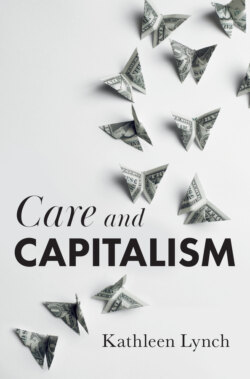Читать книгу Care and Capitalism - Kathleen Lynch - Страница 44
Conclusion
ОглавлениеThe capitalist economy works in and through a gendered division of labour, including care labour; it is a classed, raced and gendered accumulation process that distinctly advantages men within each class, especially within the household economy. Given this, many men are vested in the patriarchal-capitalist nexus, and as the rise of male-right groups shows, they have developed a sense of entitlement to power and are likely to contest its erosion (Kimmel 2013).
But hierarchies of power are not the preserve of capitalism. Bureaucratic organizations play a central role in the organization of everyday life, and while bureaucracy and capitalism are constitutionally linked, bureaucracies exist outside capitalism and are neither gender neutral (Acker 1990) nor race neutral (Ahmed 2012). The development of bureaucratic institutions, including the bureaucratic institutions of the nation state, has played an important role in institutionalizing pre-existing hierarchies of class, gender and race (Malešević 2010a) to the detriment of women and their care work. Because most large bureaucratic institutions are designed and run by powerful men, men who are free from daily hands-on care work, care work is often invisible at the centres of power. The strong instrumentalism that is endemic to output-driven bureaucratic organizations further invisibilizes the care infrastructure that lies underneath them and enables them to survive.
There are also cultural and ideological factors underpinning the devaluation and abjection of care in a gendered way. The masculine/feminine binary, where hegemonic masculinity is equated with dominance and being in control while idealized femininity is identified with compliance and service, feeds into the devaluation of women and care, as women are morally impelled to care in a hands-on way that men are not (Connell 1995, 2000). Hegemonic masculinity requires men to be dominant, especially men in positions of power (Connell and Wood 2005), even if they have to conceal this in order to have legitimacy in a contested gender order. Doing some breadwinning allows men to do hands-on caring without undermining their masculinity in a way that full-time hands-on caring does not.
The gendered dependent/independent binary also contributes to the denigration of care work as there is no legitimate state of dependency for adults in contemporary society (Fraser and Gordon 1997). Being cared for implies dependency, non-adulthood and non-citizenship; while it is acceptable at times for women, such as in pregnancy, it is not acceptable for adults generally unless they are very ill. Those who do hands-on care work with people who are highly dependent become abject by association; they are devalued by doing work that is often dirty, tiring and demanding, but lacking in status and power.
The value disassociation at play within capitalism also helps explain the abjection of caring. The commodity-producing civilizational model that is glorified under neoliberalism devalues work that has a use value rather than an exchange value. As caring is focused on producing a use value, it is defined in opposition to abstract surplus-value-producing labour, and thereby defined as unproductive and valueless (Scholz 2011), especially when it is unpaid.
If care is to challenge capitalism as a source of ethics and a site of resistance, not only must the capitalist value of profit at all costs be contested, but so too must the deeply gendered and racialized hierarchical social order that underpins it. The equation of masculinity with dominance and power is a key concern; a hegemonic masculinity that also equates the ideal man with excessive wealth urgently needs to be contested.
